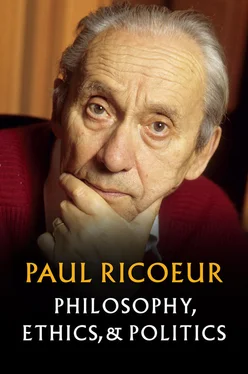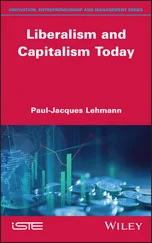In this regard, I do not see how one could develop a political philosophy and reflect on democracy – that is to say, the regime that gives place to conflicts and negotiation, and thus in which there is maximum participation in decision-making – if one cannot say what a deciding being is. This is an anthropological problem: what is a being who makes a decision in a social context, with others than herself? If I say I am hostage to the other, as Levinas thinks, what can I do? What politics can I engage in? Levinas himself is led to value the third party, that is to say, the faceless. I enter into a relation of justice when I have duties and rights with respect to people I will never meet: people who sort my mail and deliver it to me within twenty-four hours… The social bond is composed of all these faceless individuals. What is the status of the faceless? The “each one,” which is distributive, the German je , which is not the on (“one”), as in the expression “to each his due.” It is because of the problem of justice that I became interested in Rawls: how can a relation of justice be established in an unequal distribution? All unequal distributions are not morally equivalent. Now, how can the idea take root that the most unfairly disadvantaged participant in an unequal distribution must be respected, if one does not have a certain conception of persons as irreplaceable? In his opening pages, Rawls affirms that justice is the virtue of institutions. In this way, there is an irreducibility of the phenomenon of institutions: the rules of living together are derivable neither from the self-positing of a subject – and from this standpoint one is right to invoke Levinas – nor from the injunction in the second person. I should like to connect the reciprocity in the distribution of tasks and roles to the notion of “each one”: the institution distributes roles and, in this way, engenders the “each one.” But the operator of distribution is other than these roles. We rediscover Levinas’s third party and even the Old Testament: the widow and the orphan Levinas speaks of. I do not necessarily know the widow and the orphan, they are social situations. In tribal societies, the widow was someone whose husband left no brother to marry her, and so someone who could not be taken back into the system of kinship. This is the very model of the third party, the faceless par excellence. It is to them that we have a duty of justice. Insofar as tribal rules function, there is no need to raise the problem of justice. Things have not fundamentally changed. Today as well, there are those who are left out of the distribution. What should astonish us, however, is that we believe that they have a right. What is the basis of this right, if not the fact, not always perceptible, that these are persons? For this, we need concepts of capacity, of disposition, which, once again, are concepts belonging to an anthropology, putting into play ontological resources such as dynamis , energeia .
When you say there is something here to be thought, is this also a matter of public intervention? Should the philosopher intervene in the public debate?
Yes, although the appropriate place is not always the political scene in the narrow sense, but instead in places like associations, for it is a matter of reconstructing a civil society that does not coincide with the political society. With respect to the fourth world, local action is most effective. To recall Edgar Morin’s analyses, we are confronting a social object that is much more complex than all the models we could apply to it in order to change it: we must describe the complex object, but intervene where we are. Global strategies have too wide a mesh; we need more narrowly targeted strategies, based on neighborhood relations, etc. There are resources of generosity still slumbering that have to be awakened by playing on passions that are good passions.
1 1 Interview with Joël Roman and Étienne Tassin, “A quoi pensent les philosophes?,” Autrement, November 1988.
2 2 Mikel Dufrenne and Paul Ricoeur, Karl Jaspers et la philosophie de l’existence (Paris: Le Seuil, 1947).
3 3 Karl Jaspers, The Great Philosophers, tr. R. Manheim (New York: Harcourt, Brace & World, 1962).
4 4 Karl Jaspers, Von der Wahrheit (Munich: Piper, 1947).
5 5 Edmund Husserl, Logical Investigations, tr. J. N. Findlay (London: Routledge, 1973).
6 6 Edmund Husserl, Ideen, French translation by Paul Ricoeur, Idées directrices pour une phénoménologie pure (Paris: Gallimard, 1950). Ideas Pertaining to a Pure Phenomenology and to a Phenomenological Philosophy – First Book: General Introduction to a Pure Phenomenology, tr. F. Kersten (The Hague: Nijhoff, 1982).
7 7 Paul Ricoeur, De l’interprétation. Essai sur Freud (Paris: Le Seuil, 1965). Freud and Philosophy: An Essay on Interpretation, tr. D. Savage (New Haven and London: Yale University Press, 1970). See also Le Conflit des interprétations. Essais d’herméneutique I (Paris: Le Seuil, 1969). The Conflict of Interpretations: Essays in Hermeneutics (Evanston: Northwestern University Press, 1974).
8 8 Ricoeur, Lectures on Ideology and Utopia.
9 9 John Rawls, A Theory of Justice (Cambridge: Harvard University Press, 1971). Allan Bloom, The Closing of the American Mind (New York: Simon & Schuster, 1987).
10 10 Gilles-Gaston Granger, Pour la connaissance philosophique (Paris: Odile Jacob, 1988).
11 11 Philippe Lacoue-Labarthe, La Fiction du politique (Paris: Bourgois, 1988). Heidegger, Art and Politics: The Fiction of the Political, tr. C. Turner (Oxford: Blackwell, 1990).
2. Sketch of a Plea for the Capable Human Being 1
ARNAUD SPIRE: You have expressed on many occasions your reservations regarding attempts to explain a philosophical work by the life of its author. Do you think that a body of work like yours speaks for itself?
PAUL RICOEUR: That is a reader’s point of view, which does not entirely correspond with my own. I am aware instead of the fragmentary character of my philosophical work. Each of my books gravitates around a well-determined question. A chronological approach can be justified to the extent that each work develops out of questions unresolved in the preceding one. Here is an example. The Symbolism of Evil , the second part of volume two of my Philosophy of the Will , 2comes out of an unresolved question in the first volume that concerned the voluntary and the involuntary, where I speak of a sort of “innocent will,” that is to say, a will for which the question of good and evil does not arise. The history of humanity, of peoples, however, is profoundly marked by evil in the form of violence, lies, and oppression. The fact that this appears nowhere in a philosophy of the “voluntary” in opposition to the “involuntary” appeared untenable to me. So, I then approached the theme by way of the myths that recount how evil came into the world – in particular, by way of those myths at the origin of Western culture. Interpretations of these symbols and grand narratives already existed. In this way, I was confronted by readings of the origin of evil opposed to my own, by those I called the “philosophers of suspicion.” I considered the interpretations of Marx, Freud, and Nietzsche to be reductive, in the sense that, by reduction, they take us “back behind.” I mean reduction to the economic and social foundation in Marx, reduction to instincts in Freud, and reduction to the will to life and to the depths of desire in Nietzsche. All these reductions conflicted with the amplifying interpretations opening toward a sort of sacred horizon.
In short, according to you, whether in Marx, Freud, or Nietzsche, evil is conceived in a reductive manner, since in each case evil is reduced to a single cause. On the other hand, you have developed a conception of evil that is plural and multiform.
Читать дальше












